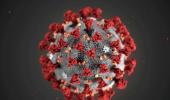A study conducted jointly by researchers at IIT-Bhubaneswar and the AIIMS has shown that the spread of COVID-19 may pick up pace during peak monsoon and winter with a fall in the mercury.

The rainfall, decrease in temperatures and cooling of the atmosphere coupled with progression towards winter may environmentally favour the spread of COVID-19 in the country, according to the study led by V Vinoj, Assistant Professor of the School of Earth, Ocean and Climatic Sciences at IIT-Bhubaneswar.
The report titled "COVID-19 spread in India and its dependence on temperature and relative humidity" took into account the pattern of the coronavirus outbreak and the number of such cases in 28 states between April and June.
The study revealed that the rise in temperatures leads to a decline in the transmission of the virus, Vinoj said.
"The study, which is in its pre-print stage, shows that the temperature and relative humidity have a significant impact on the disease growth rate and doubling time.
"It suggests that a one-degree-Celsius rise in temperature leads to a 0.99 per cent decrease in cases and increases the doubling time by 1.13 days, implying a slowdown of the virus spread," he told PTI.
The study also found that an increase in relative humidity tends to decrease the growth rate and doubling time of coronavirus cases by 1.18 days.
The researchers, however, said since the study was not conducted during the period of high humidity starting from the monsoon and the onset of winter, more research needs to be undertaken to establish its exact impact.
Dr Bijayini Behera of the department of Microbiology at AIIMS Bhubaneswar, who was part of the research team, said several studies suggested that a fall in the temperatures and a relatively low humidity facilitated such an outbreak in the past.
The study also carried out an analysis of the impact of solar radiation on the spread of COVID-19.
"We found that a higher surface-reaching solar radiation leads to a reduction in the number of infections and an increase in the doubling time of cases, similar to that of temperatures," Vinoj said.
There is an average temperature difference of seven degrees Celsius between the winter and summer seasons, he added.
According to the study, there is a likelihood of an increased transmission of the coronavirus during winter, which may be a major challenge for health workers and policymakers to enforce mitigation and control measures.
The objective of the study is to help authorities bring effective measures to combat the pandemic, Vinoj said.











 © 2025
© 2025